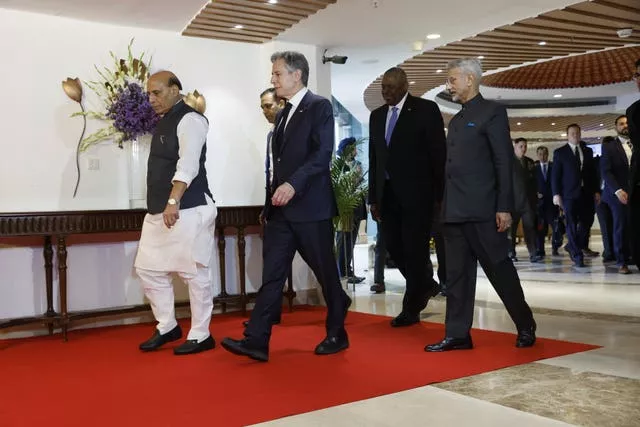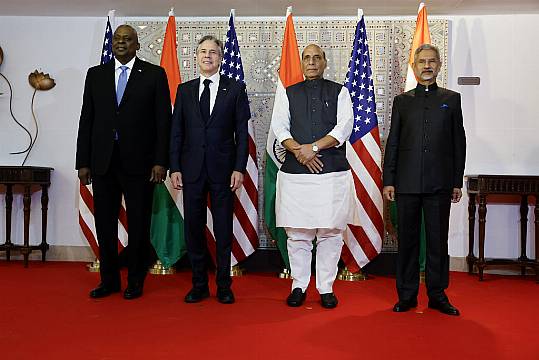Top diplomats and defence chiefs from India and the United States met on Friday focusing on security issues involving the Indo-Pacific, China and the Israel-Hamas war.
US secretary of state Antony Blinken said the US and India have a strong partnership and would discuss matters with implications for the future.
“The future is now,” he told reporters.
“We are promoting a free and open and prosperous Asia-Pacific, including by strengthening our partnership in the Quad with Japan and Australia,” Mr Blinken said in remarks at the start of the meeting.
He also said that the United States and India are bolstering their partnership in international peace and strengthening a rule-based order.
Mr Blinken also said defence co-operation was a key pillar in ties between the countries.
India’s external affairs minister, Subrahmanyam Jaishankar, said the situation in the Middle East was a big concern.
While India has condemned the Hamas attack on Israel, it has tried to balance its position by saying that “India has always advocated the resumption of direct negotiations towards establishing a sovereign, independent and viable state of Palestine living within secure and recognised borders, side-by-side at peace with Israel.”

Mr Blinken said he also discussed a diplomatic dispute that erupted when Canada alleged that India was involved in the assassination of a Sikh separatist in Canada.
“These are two of our closest friends and partners and, of course, we want to see them resolving any differences or disputes that they have,” Mr Blinken said.
“As a friend of both, we think it’s very important that India work with Canada on its investigation, and that they find a way to resolve this difference in a co-operative way.”
The dispute started when Canadian prime minister Justin Trudeau said there were “credible allegations” of Indian involvement in the killing of Canadian citizen Hardeep Singh Nijjar in suburban Vancouver in western Canada. India rejected the accusation.
Mr Blinken is in Asia engaging in intense diplomacy with regional partners to show unity over Russia’s war in Ukraine and other major issues and prevent existing differences on Gaza from deepening.
“While the wars in Gaza and Ukraine are urgent issues, the more abiding challenge for both the US and India relates to China and its revisionist orientation,” said C Uday Bhaskar, a retired navy officer.
The recent intimidation of the Philippines by China is a matter of considerable relevance to the Association of Southeast Asian Nations as well as the four Quad nations: the US, Japan, India and Australia, he said.
China and the Philippines have had several recent confrontations in the South China Sea, where several governments have overlapping claims.
India’s relationship has deteriorated with China since 2020, when Indian and Chinese troops clashed along their disputed border in the Himalayan Ladakh region, leaving 20 Indian and four Chinese soldiers dead.
A standoff involving thousands of soldiers in the eastern Ladakh region continues despite several rounds of military and diplomatic talks.
A Line of Actual Control separates Chinese and Indian-held territories from Ladakh in the west to India’s eastern state of Arunachal Pradesh, which China claims in its entirety. India and China fought a war over their border in 1962.
Mr Blinken is in Asia engaging in intense diplomacy with regional partners to show unity over Russia’s war in Ukraine and other major issues and prevent existing differences on Gaza from deepening.
India and the US have held the two-plus-two talks between India’s external affairs and defence minister and the U.S. secretaries of state and defence since 2018 to discuss issues of concern and strengthen bilateral ties.







